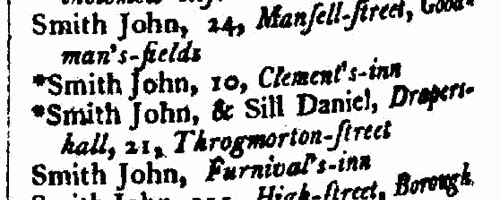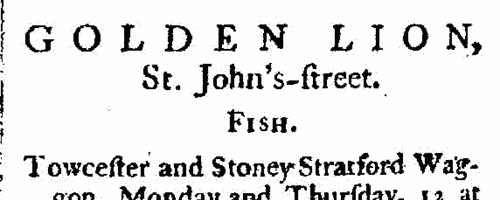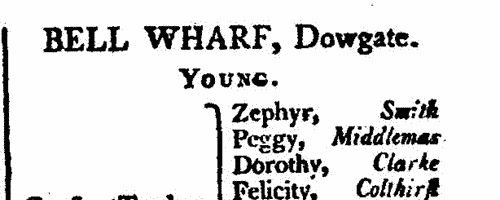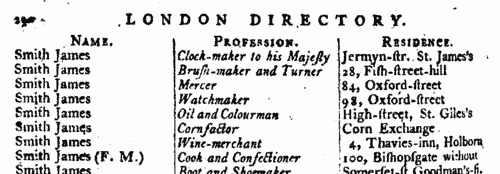Our indexes include entries for the spelling swaine. In the period you have requested, we have the following 531 records (displaying 181 to 190):
 Masters of clerks and apprentices
(1788) Masters of clerks and apprentices
(1788)
Apprenticeship indentures and clerks' articles were subject to a 6d or 12d per pound stamp duty: the registers of the payments usually give the master's trade, address, and occupation, and the apprentice's name, as well as details of the date and length of the apprenticeship. 2 January to 23 August 1788. IR 1/33 | Sample scan, click to enlarge

|
 Apprentices and clerks
(1789) Apprentices and clerks
(1789)
Apprenticeship indentures and clerks' articles were subject to a 6d or 12d per pound stamp duty: the registers of the payments usually give the master's trade, address, and occupation, and the apprentice's name, as well as details of the date and length of the apprenticeship. 2 January to 31 December 1789. IR 1/34 | Sample scan, click to enlarge

|
 Apprentices and clerks
(1790) Apprentices and clerks
(1790)
Apprenticeship indentures and clerks' articles were subject to a 6d or 12d per pound stamp duty: the registers of the payments usually give the master's trade, address, and occupation, and the apprentice's name, as well as details of the date and length of the apprenticeship. 2 January to 31 December 1790. IR 1/34 | Sample scan, click to enlarge

|
 Apprentices registered in Northamptonshire
(1791) Apprentices registered in Northamptonshire
(1791)
Apprenticeship indentures and clerks' articles were subject to a 6d or 12d per pound stamp duty: the registers of the payments usually give the master's trade, address, and occupation, and the apprentice's name, as well as details of the date and length of the apprenticeship. There are central registers for collections of the stamp duty in London, as well as returns from collectors in the provinces. These collectors generally received duty just from their own county, but sometimes from further afield. The indentures themselves can date from a year or two earlier than this return. (The sample entry shown on this scan is taken from a Bristol return. Each entry has two scans, the other being the facing page with the details of the indenture, length of service, and payment of duty.) IR 1/66 | Sample scan, click to enlarge

|
English Civil Servants
(1791)
Officers and officials of the various government departments, mostly in London, listed in the Universal British Directory. It includes the royal household, the departments of state, and public offices | Sample scan, click to enlarge

|
London Attorneys
(1791)
A list of attorneys residing in London, Westminster, the borough of Southwark and their environs, from the Universal British Directory. Those without a mark before the name practised in the King's Bench; those with a (C) in the Common Pleas; and those with a * in both courts. | Sample scan, click to enlarge

|
London innkeepers and coach proprietors
(1791)
A list of the different London inns (each with the surname of the innkeeper), the proprietors of the coaches, machines, diligences and waggons going from each, and their hours of setting out, from the Universal British Directory | Sample scan, click to enlarge

|
London Wharfingers and Masters of Coastal Shipping
(1791)
A list of the wharfs and wharfingers in London; the places they ship goods for; the vessels in the trade; with the masters' names, where to be spoken with, and time of sailing: from the Universal British Directory | Sample scan, click to enlarge

|
Traders and Merchants in London
(1791)
The Universal British Directory was published in five volumes, starting in 1791. The professions included in the London section are very diverse: the addresses are mostly from central London. Some are marked 'F. M.', meaning Freeholder of Middlesex. | Sample scan, click to enlarge

|
 Apprentices registered in Nottinghamshire
(1792) Apprentices registered in Nottinghamshire
(1792)
Apprenticeship indentures and clerks' articles were subject to a 6d or 12d per pound stamp duty: the registers of the payments usually give the master's trade, address, and occupation, and the apprentice's name, as well as details of the date and length of the apprenticeship. There are central registers for collections of the stamp duty in London, as well as returns from collectors in the provinces. These collectors generally received duty just from their own county, but sometimes from further afield. The indentures themselves can date from a year or two earlier than this return. (The sample entry shown on this scan is taken from a Bristol return. Each entry has two scans, the other being the facing page with the details of the indenture, length of service, and payment of duty.) IR 1/66 | Sample scan, click to enlarge

|
Research your ancestry, family history, genealogy and one-name study by direct access to original records and archives indexed by surname.












